Choosing a domain name can seem like an easy task. However, selecting the right domain name is crucial. A strong domain name is essential in establishing your online presence as a content creator. A well-chosen domain name can enhance your brand’s identity, improve search engine visibility, and make it easier for users to remember and find your website. The ultimate goal is to have your website align with all your social handles, making it easy for users to remember and locate you across platforms. In this blog article, I will walk you through the essential considerations to ensure you choose a domain name that aligns with your content goals.
1. Keep it Short and Simple
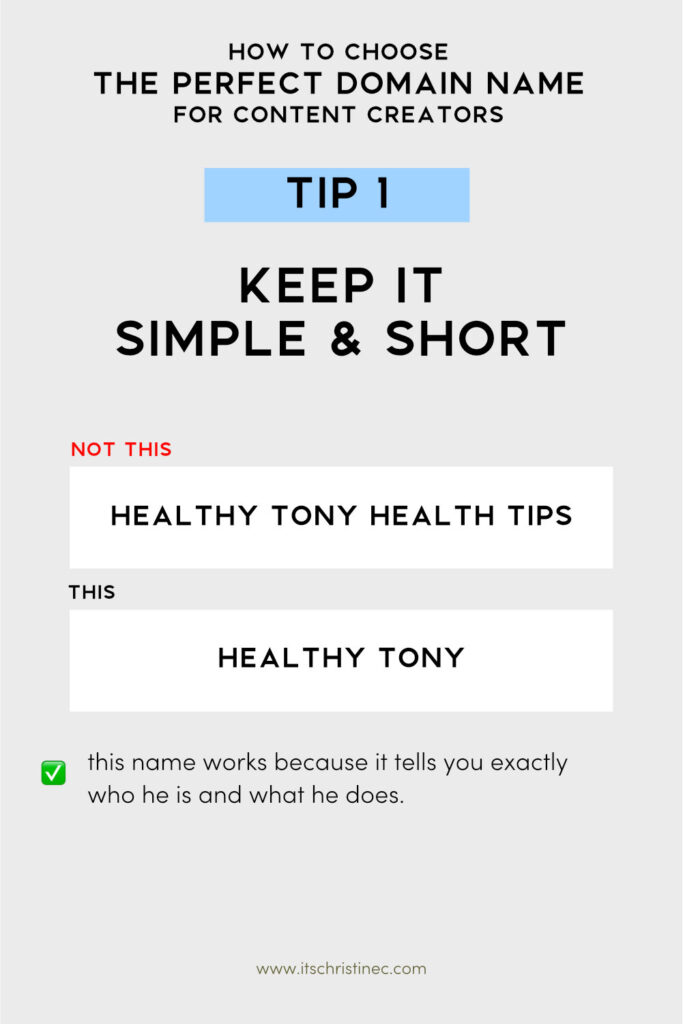
The best domain names are like the best social handles: short, simple, and memorable. The goal is to have a domain name that clearly communicates what your site is about. To simply put it, take what you do and remove all additional words. I think this is a better way to choose a domain name – keep it simple stupid.
Why Having It Short Matters:
- Memorability: Shorter domain names are easier to remember and are less prone to typos.
- User-Friendly: Simple names are easier to type and less likely to be mistyped.
Tips:
- Aim for 6-14 Characters: Shorter names are preferable, but ensure they’re long enough to be descriptive.
- Avoid Complex Words: Steer clear of complex spellings, unusual characters, or symbols like underscores or random periods.
Example: Instead of “healthytonyhealthtips.com,” go for “healthytonytips.com.”
2. Make it Brandable
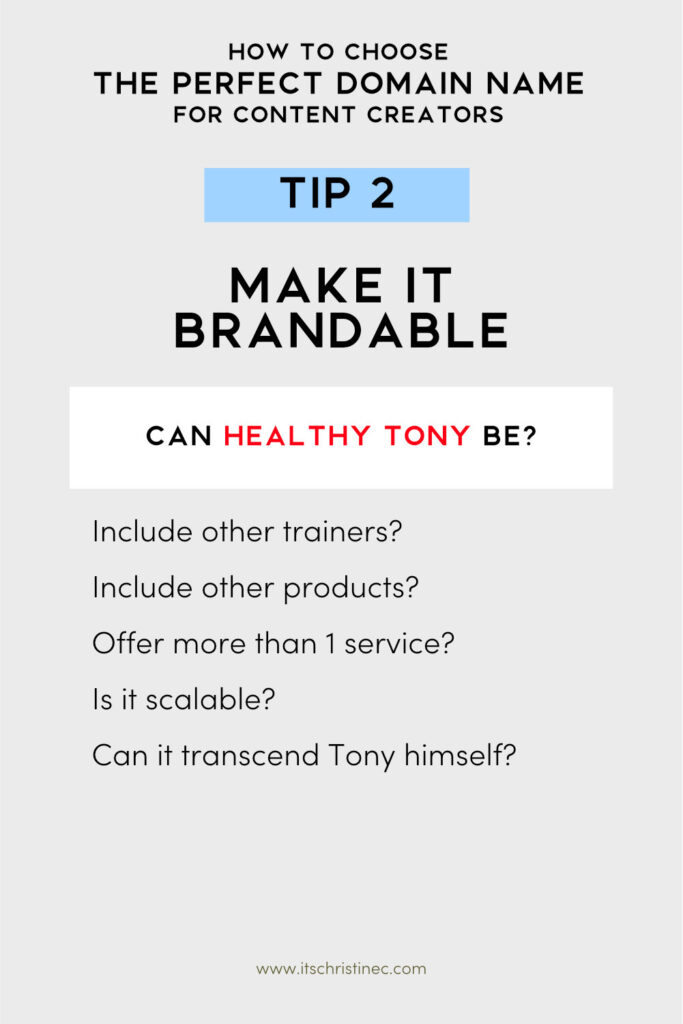
A brandable domain name reflects your brand’s personality and sets you apart from competitors.
Why It Matters:
- Identity: A unique, brandable domain helps establish a strong brand identity.
- Differentiation: A brandable name distinguishes you from competitors, making your brand easier to recognize.
Tips:
- Unique and Distinctive: Choose a name that stands out and reflects your brand’s values or mission.
- Consider Your Brand’s Voice: Align your domain name with the tone and personality of your brand.
Example: “EvergreenDesigns.com” is more brandable than “Chloegreen.com.”
3. Say Exactly What You Do
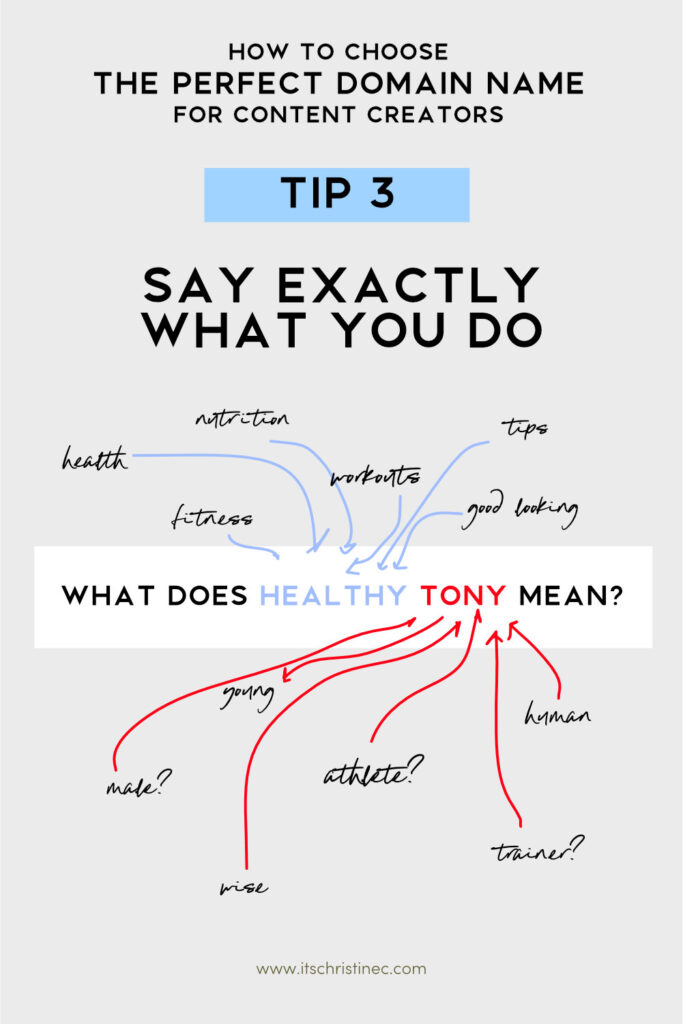
Including relevant keywords can improve search engine rankings and provide instant context about your website.
Why It Matters:
- SEO Benefits: Relevant keywords in your domain can help with search engine optimization (SEO).
- Relevance: Keywords give users immediate insight into what your website is about.
Tips:
- Use Primary Keywords: Incorporate industry-relevant keywords that reflect your niche.
- Avoid Keyword Stuffing: Ensure your domain is natural and easy to read, not overloaded with keywords.
Example: “OrganikinCareSolutions.com” is descriptive and includes relevant keywords.
4. End it Properly - aka - Choose the Right Domain Extension
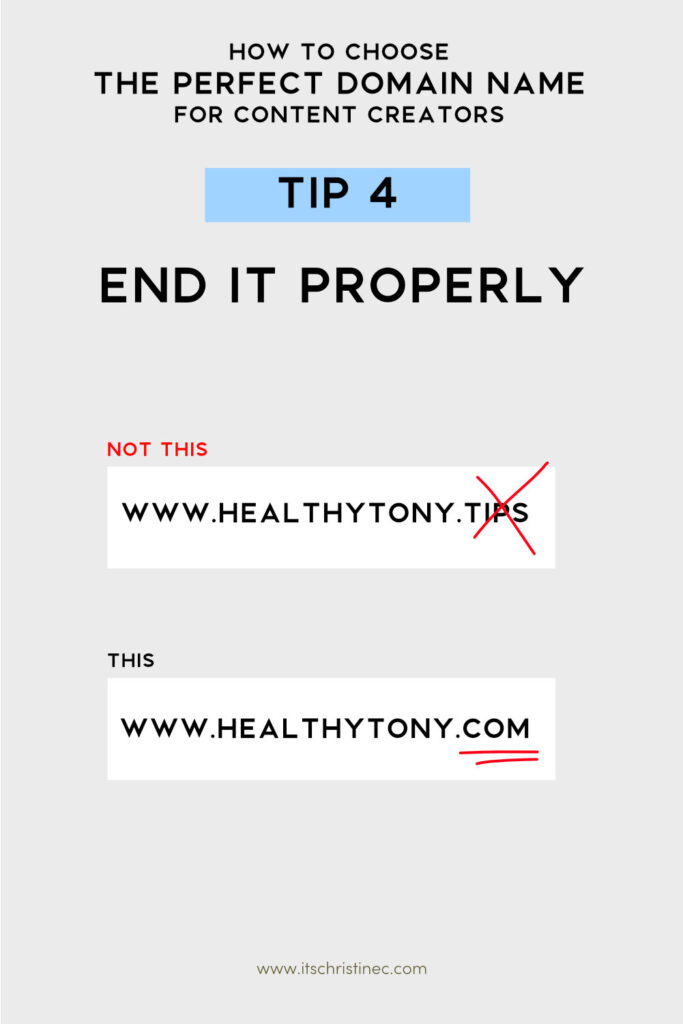
The domain extension (.com, .org, .net, etc.) affects your website’s credibility and user trust. Although it might be cool to have your domain end in .media, most people will have an underlying insecure feeling about it.
Why It Matters:
-
- Credibility: The extension you choose can influence how trustworthy and professional your site appears.
-
- Availability: Opting for different extensions may give you more flexibility in securing your desired domain name.
Tips:
-
- .com is Preferred: While .com is the most recognizable and easiest to remember, other extensions can also be suitable based on your niche.
-
- Consider Niche Extensions: Depending on your industry, consider extensions like .tech, .store, or .design. But if you can get .com I highly recommend you choose a domain that ends in .com.
-
- Avoid .co when you can: I love a good .co, but unfortunately, the number of typos you could receive would 100% outweigh the advantages of the sleekness of .co.
Example: “HealthyTony.com” is preferred over “HealthyTony.net,” but if .com isn’t available, a niche extension like .co could work.
5. Avoid Hyphens and Numbers
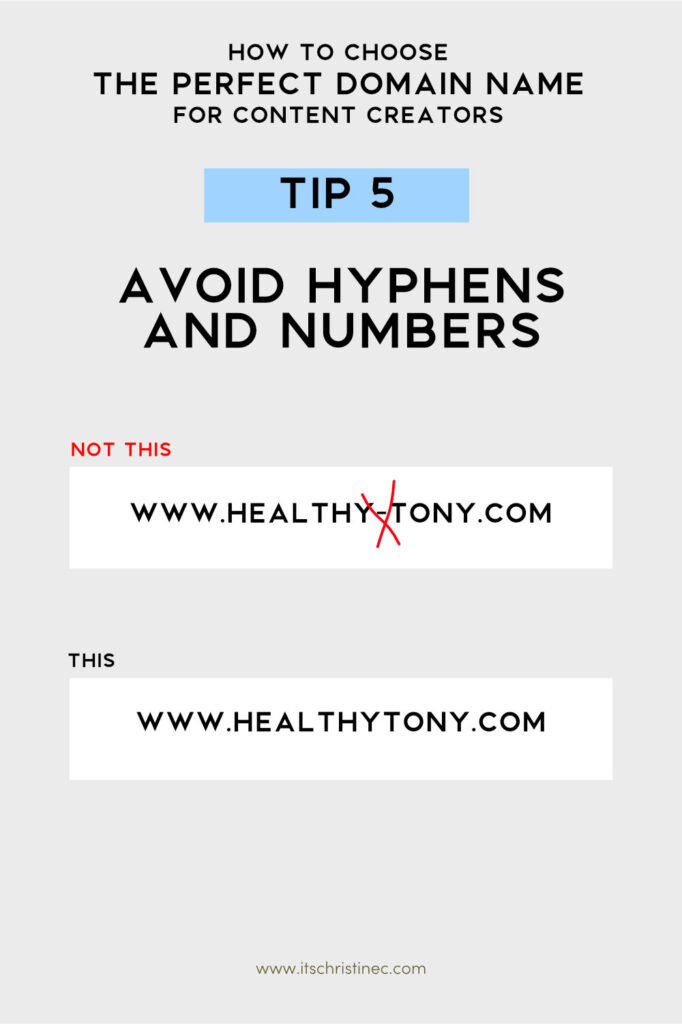
Hyphens and numbers can confuse and make your domain harder to remember or type.
Why It Matters:
-
- Clarity: Hyphens and numbers increase the chance of users mistyping your domain.
-
- Professionalism: Domains with hyphens or numbers can appear less professional and trustworthy.
Tips:
-
- Stick to Letters: Keep your domain clean by using only letters.
-
- Avoid Confusion: Ensure the domain is easy to spell and say without unnecessary characters.
Example: “GreenThumbGardening.com” is better than “Green-Thumb-Gardening.com” or “GreenThumb123.com.”
6. Check Domain Name Availability
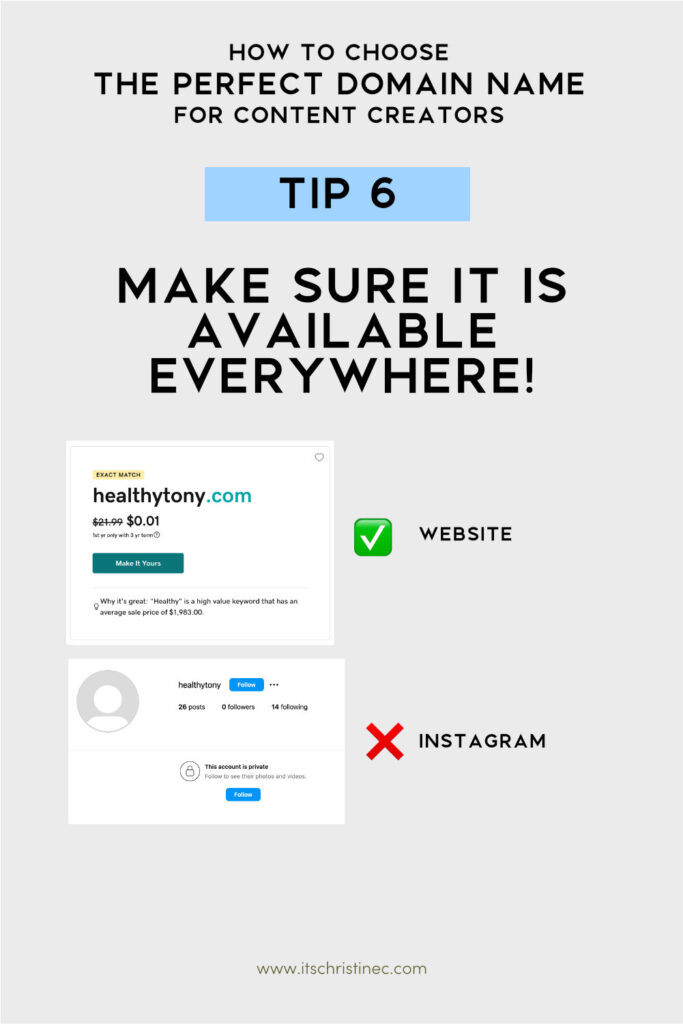
Before committing to a domain, ensure it’s available and not infringing on any trademarks or copyrights.
Why It Matters:
-
- Unique Identity: Your domain must be unique to avoid confusion with other businesses or legal issues.
-
- Avoid Legal Issues: Ensure your domain doesn’t violate trademarks.
Tips:
-
- Consider Variations: If your top choice is unavailable, try alternative extensions or variations.
Example: Check if “InnovativeSolutions.com” is available using domain search tools.
7. Think Long-Term
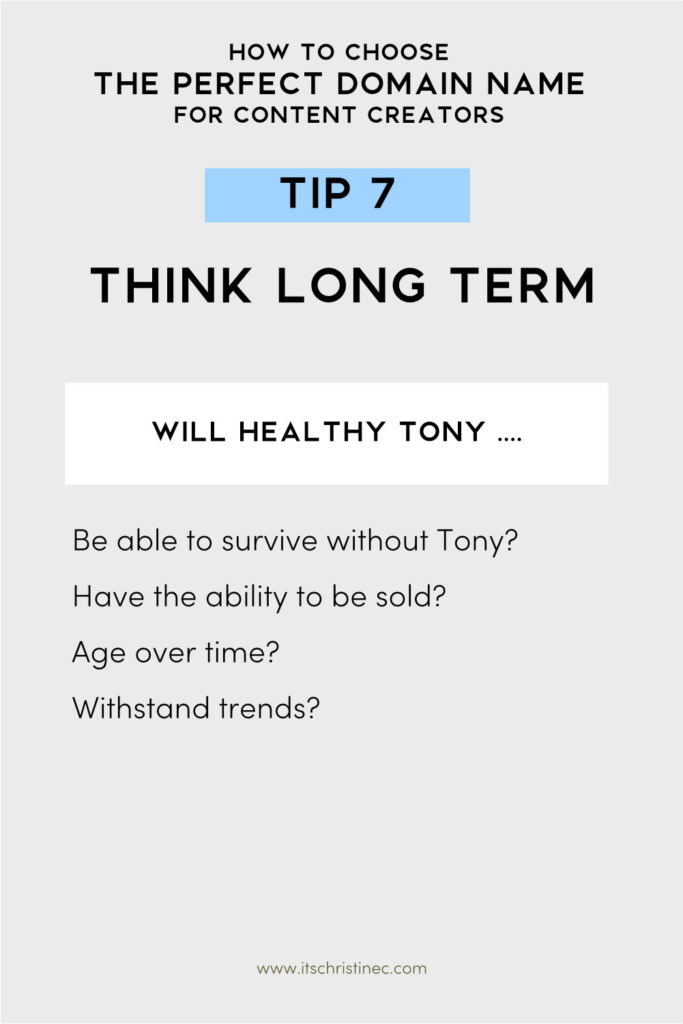
Choose a domain name that will grow with your brand and stay relevant as your business evolves.
Why It Matters:
-
- Future-Proofing: Ensure your domain is flexible enough to adapt to changes in your business.
-
- Brand Longevity: The domain should reflect your long-term goals and vision.
Tips:
-
- Avoid Trends: Don’t get stuck with trendy words that might lose relevance over time.
-
- Reflect Your Mission: Choose a domain that aligns with your brand’s purpose.
Example: “EcoFriendlyProducts.com” is a timeless choice, while “EcoTrends2024.com” could become outdated.
8. Test It Out
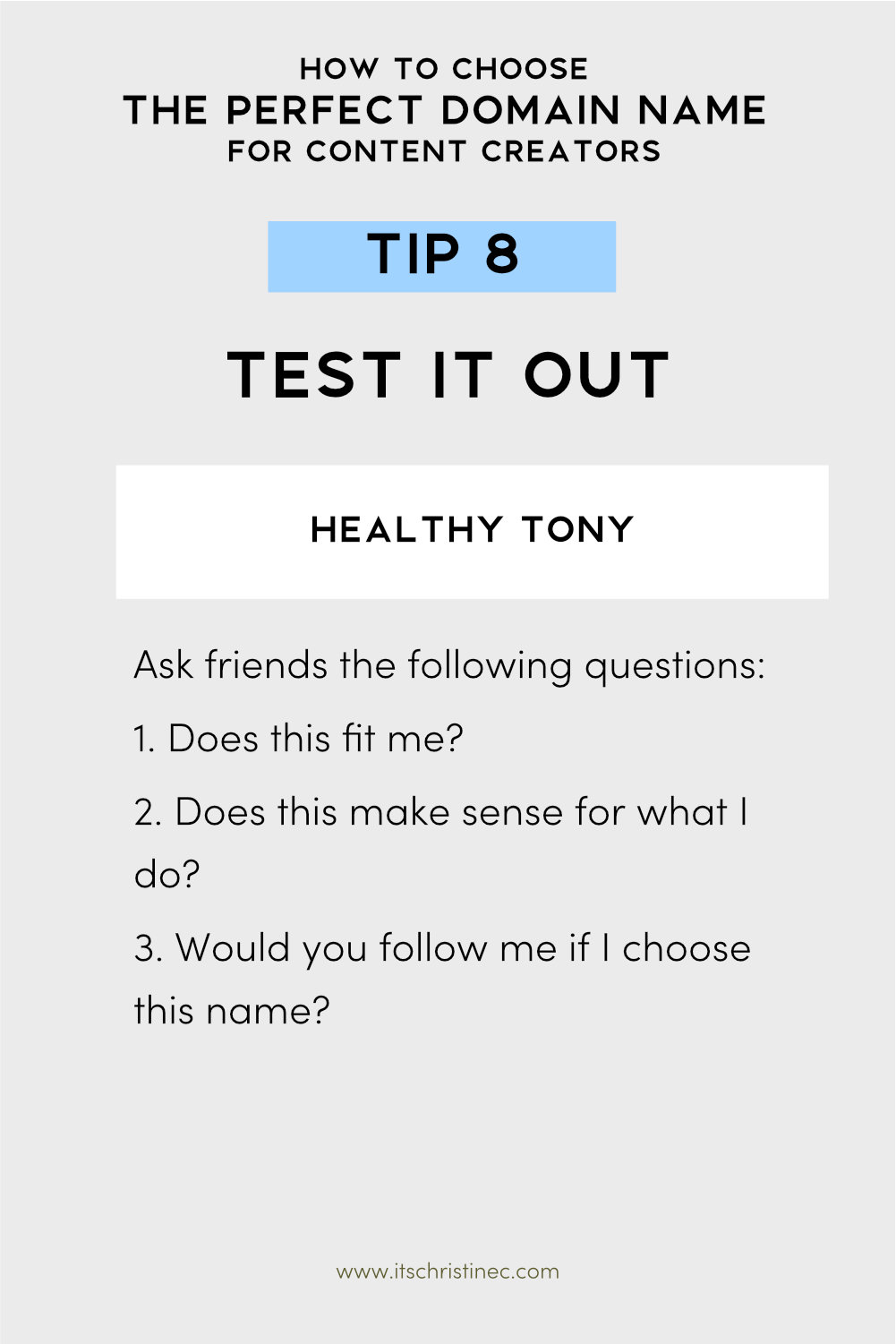
Before finalizing your domain, test it with potential users, friends, or colleagues to ensure it resonates well.
Why It Matters:
-
- User Feedback: Feedback helps confirm whether the domain name is clear, relevant, and easy to remember.
-
- Usability: Assess how the domain looks in branding materials, emails, and social media handles.
Tips:
-
- Check Pronunciation: Make sure it’s easy to say aloud, especially if you’ll be sharing it verbally.
-
- Visual Appeal: Ensure the domain looks appealing when displayed across different mediums and formats.
Example: Test how “StreamlineMarketing.com” looks on a business card or social media profile.
Conclusion
Choosing the right domain name is a critical step in establishing your online presence. By keeping it short, brandable, and relevant to your niche, and avoiding common mistakes like hyphens or complex spellings, you can create a domain name that enhances your brand identity and supports your long-term growth.
Ready to choose a domain name? Start brainstorming ideas, check availability, and consider how each option fits your brand. Already have a domain name? Explore our article about why you should create a personal website for content creators and start building yours today!







